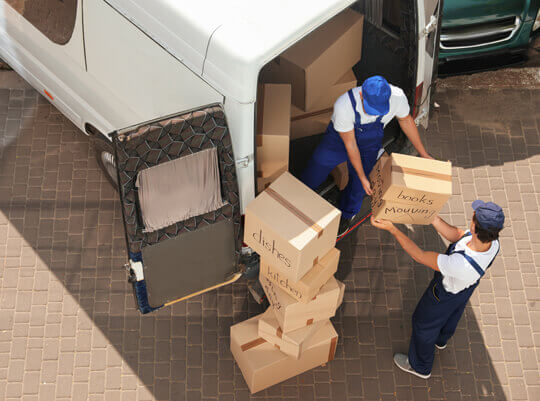Getting Moving Company Quotes is Easy on Shiply
Save time & money - up to 75% off standard rates
Used by millions of happy customers
Millions of people use Shiply

Fast and Easy
Complete one simple form and quotes come to you via email. Hassle-free, no phone calls required.

Trustworthy
All delivery companies on Shiply are feedback rated for your peace of mind.

Great Prices
As Shiply's delivery companies are already making similar trips, quotes are up to 75% cheaper than standard rates.
Preparing For Moving House
When the time comes to find new house it can be hard to know where to start. To begin with, you need to decide the date you will move, determining this will give you a goal to aim for and help you be more organised.
We’d recommend avoiding the busiest periods for house moves (the end of the week and bank holidays). If you can arrange a moving company for midweek then you should have an easier time.
When you need to find a moving company it pays to ask around, if you have any friends or family that have relocated recently then it’s worth contacting them for advice on reliable moving services.
Preparations to make when moving
Moving is a complicated job, often with more to sort out then initially realised, we’ve made a list of the important things to consider when you’re relocating.
Work out transit insurance: Moving companies offer insurance, but things you’ve boxed yourself might not be included, make sure you check what level of cover any firms have.
Clean your new place: If you can arrange to get professional cleaners to clear up your new abode before you move in it will make things lot easier (some moving firms offer this too).
Notify the proper parties
You might be surprised how many people need to know you’re getting a new place, here’s a list of who to tell:
- ISPs
- TV Licensing
- Banks Pensions and Investments
- Card companies (Debit, credit and store)
- Inland Revenue
- Council Tax Authority
- Work and Education
- DVLA
- Other Subscriptions (Magazines, etc.)
- Friends and Family!
De-clutter: Throw away anything you don’t want to keep, moving house will be a lot easier if you don’t take all of your old love letters and reader’s digests with you.
Packing: Packing is obviously the most important part of a house move, make sure to separate rooms into separate boxes and include adequate padding for fragile items like vases and plates. (Old towels will suffice, but polystyrene or bubble wrap is good too). Make sure not to make separate containers too heavy, it’s easy to over pack things like books and make boxes too heavy to carry.(Some removal companies will help you pack, but you will pay extra)
Organise and inventory: If you’re doing the packing yourself, organise your boxes by rooms and label or colour code them, so you know what’s going where when you get to your new house. Also make a list of the most important articles so you can check them off when you arrive.
Arrange temporary accommodation: If your move will take more than one day, then it may be worth arranging to stay with friends or getting a hotel.
Additional work to do: Collect any spare keys from neighbours etc. and also create a guide for the new residents moving in detailing any specifics of the house and tips on the local area.

Moving Checklist
When the time comes to find new house it can be hard to know where to start. To begin with, you need to decide the date you will move, determining this will give you a goal to aim for and help you be more organised.
We’d recommend avoiding the busiest periods for house moves (the end of the week and bank holidays). If you can arrange a moving company for midweek then you should have an easier time.
When you need to find a moving company it pays to ask around, if you have any friends or family that have relocated recently then it’s worth contacting them for advice on reliable moving services.
Preparations to make when moving
Moving is a complicated job, often with more to sort out then initially realised, we’ve made a list of the important things to consider when you’re relocating.
Work out transit insurance: Moving companies offer insurance, but things you’ve boxed yourself might not be included, make sure you check what level of cover any firms have.
Clean your new place: If you can arrange to get professional cleaners to clear up your new abode before you move in it will make things lot easier (some moving firms offer this too).
Notify the proper parties
You might be surprised how many people need to know you’re getting a new place, here’s a list of who to tell:
- ISPs
- TV Licensing
- Banks Pensions and Investments
- Card companies (Debit, credit and store)
- Inland Revenue
- Council Tax Authority
- Work and Education
- DVLA
- Other Subscriptions (Magazines, etc.)
- Friends and Family!
De-clutter: Throw away anything you don’t want to keep, moving house will be a lot easier if you don’t take all of your old love letters and reader’s digests with you.
Packing: Packing is obviously the most important part of a house move, make sure to separate rooms into separate boxes and include adequate padding for fragile items like vases and plates. (Old towels will suffice, but polystyrene or bubble wrap is good too). Make sure not to make separate containers too heavy, it’s easy to over pack things like books and make boxes too heavy to carry.(Some removal companies will help you pack, but you will pay extra)
Organise and inventory: If you’re doing the packing yourself, organise your boxes by rooms and label or colour code them, so you know what’s going where when you get to your new house. Also make a list of the most important articles so you can check them off when you arrive.
Arrange temporary accommodation: If your move will take more than one day, then it may be worth arranging to stay with friends or getting a hotel.
Additional work to do: Collect any spare keys from neighbours etc. and also create a guide for the new residents moving in detailing any specifics of the house and tips on the local area.
Completing Your Move
Once you know the dates of your move, we can help you find a reputable mover to help you relocate.
Moving firms are busy, so finding one that is on a return journey empty is an ideal opportunity to get your house move fit into their busy schedule.
This is where Shiply comes in; by posting the details of your house move with us you, registered moving companies will quote competitively on your relocation to try and win your business.
Then you can compare quotes from available firms and check the feedback they have received from other jobs they’ve completed on Shiply.
Once the big day arrives and your goods are on the way you’ll either need to follow the moving van or ideally be there before them. This way you can get to unloading as soon as possible, you don’t want to keep the moving firm waiting as this could potentially incur extra charges.
Depending on the level of service you went for the moving men/women might stay around to help you unpack. Either way, they should help you unload the van and stay long enough to let you make some initial checks to make sure that nothing looks damaged.
When everything’s unloaded and unpacked and you’ve settled into your new place, we’d appreciate it if you could leave feedback for the mover.
Feedback on Shiply is vital to helping our users compare available services; it also assists the mover themselves as they will know if they can make any improvements in the future.
FAQs
Does Shiply Cover My Area?
Yes! There are couriers using Shiply all over the country and abroad, so whether you need to move a sofa across town or send a car across Europe, we have got you covered.
Does Shiply Have Different Sized Vehicles?
There are thousands of couriers on Shiply, with a wide range of vehicle sizes capable of handling any delivery. Providing the rough dimensions (and pictures if possible) on your listing will allow the delivery company to get the right vehicle sent out to you.
How Can I Contact Shiply Support?
Shiply Support is available from 9am - 6pm Monday to Friday. You can send an email to .
Who Will Carry Out My Delivery?
Whoever you choose! There are thousands of rated transport providers on our platform ready to make a bid to carry out your delivery. It is up to you to decide which quote to accept.
When Will I Receive A Quote?
You will typically start to receive quotes within 30 minutes. If you are worried about the lack of quotes, try adding some more detail to your listing as transport providers may be unsure of dimensions or weight and feel unable to provide an accurate quote. If your delivery is urgent, you can try our 'featured delivery' feature which moves your listing to the top of the search page for couriers.
How Many Quotes Will I Receive?
Whilst there is no guarantee of quotes, 98% of our listings receive at least 3 quotes, so you are likely to find someone who can undertake the delivery of your items.
Does Shiply Provide Packing Materials?
If your item requires packing materials or extra care then you should make sure this is highlighted in your listing and discussed with any transport provider whose quote you are considering. Couriers on Shiply are able to provide all levels of service and can help pack your items, just ensure you inform them of your needs.
Will My Goods Be Tied Up Securely?
Transport providers will almost always tie up an item in the transport vehicle, as the risk of damage from moving around during transit is high. You should always confirm safety precautions and packing needs with transport providers before accepting a quote.
Can Items Be Taken Upstairs?
Yes, items can be taken upstairs if needed, and can also be assembled. Transport providers on Shiply are happy to provide these services, but you should ensure that you are mentioning these requirements in your listings as it may mean a second person is required for the move.
Can I Travel With My Goods?
The majority of transport providers on Shiply are only insured for the transportation of goods, however, some are also able to take people. If you need to travel with your goods, make sure to mention this in your listing and highlight this to any courier who quotes on your listing.
What If I Need To Cancel My Booking?
If you have accepted a quote and paid the deposit but wish to cancel the delivery, then you should first inform your chosen transport provider that you no longer require the delivery. You should then contact us at to have your deposit refunded.
Can I Change The Address Of The Delivery?
If you have not yet accepted a quote then you are able to change the address of your listing. Note that editing details of your listing after publishing will result in active quotes being voided, so you will have to wait for new quotes to come in. If you have already accepted a quote and need to change the address, please let your transport provider know and contact us at .
How Shiply works

Recent Deliveries
Millions of people use Shiply to move goods around the globe at a much more affordable price - by making use of spare capacity along pre-existing routes.
- Move Anything Large or Bulky
- Low Prices Guaranteed
- Customer Reviewed Transport Providers
- Dedicated Trust & Safety Team
- Friendly Customer Support Team

















